If you already know what ghee is, it is probably because you’re familiar with Indian cooking. Ghee is a type of clarified butter commonly used in South Asian cuisine, and it also plays a role in traditional medicine and some religious rituals. In India, cow ghee is often closely linked with Ayurveda, a 5,000-year-old form of natural healing with roots. Cow ghee is used in the Ayurvedic diet and in Ayurvedic medicine. It is often used in detoxification and massage. However, because of its high levels of cholesterol & saturated fat, over the past several years, ghee has been blamed for an increase in coronary artery disease.
But according to a study published in 2010 in the journal AYU (an International Quarterly Journal of Research in Ayurveda), a moderate amount of ghee consumption may increase triglyceride levels, but doesn’t increase the processes that are linked to a higher risk of cardiovascular disease. In another study, ghee has been found to have protective effects on the liver, anticonvulsant benefits and may help with wound healing and memory enhancement.
Typically, butter is made up of butterfat, milk solids & water. If you take out the milk solids & water and only have pure butterfat left, it becomes clarified butter. Ghee is clarified butter that has been cooked longer to remove all the moisture, and the milk solids are browned (caramelized) in the fat and then strained out. This gives a rich nutty taste.
When it’s hot, ghee is a golden liquid. Once it cools, it looks like creamy butter.
Ghee and nutrition
One tablespoon (15 gm) of ghee has approximately 135 calories, all of which come from fat. That small amount of ghee has 15 gm of total fat and 9 gm of saturated fat or 45 per cent of the recommended daily value. A tablespoon of ghee also has 45 mg of cholesterol or 15 percent of the recommended daily value. Ghee is free of sodium, carbohydrates, fiber, sugar & protein. But ghee is also very rich in vitamin A, a fat-soluble vitamin that is key for vision, immune function, reproduction and cell growth. 1 tablespoon of ghee nearly has as much vitamin A as 1/2 cup of carrots. It also acts as an antioxidant and is good for the immune system. It has a high concentration of butyric acids and fatty acids that have antiviral properties.
Read our blog- HEALTH BENEFITS OF DESI COW GHEE THAT MAKE IT A MUST-HAVE IN YOUR KITCHEN
Read our blog – Why The Pure Desi Cow Milk Ghee Is Costlier Than Normal Ghee?
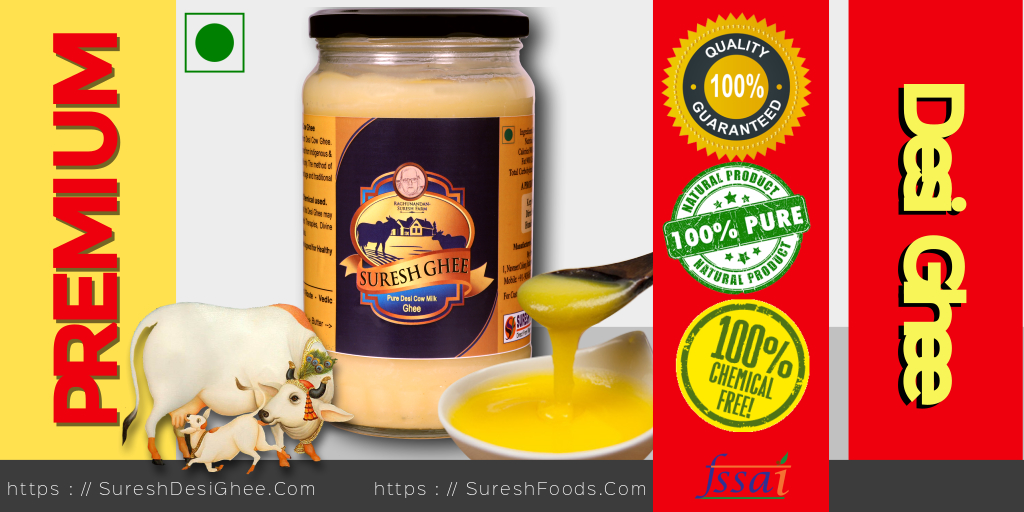
Buy Pure Desi Cow Ghee Online : Order Now. Free Shipping
Modern science now verifies what Ayurvedic health science has said for thousands of years. Ghee has a host of health & cooking benefits and is good for the mind and spirit.
Benefits of Ghee
Ghee For Skin
- Hydrates dry skin: The fatty acids in ghee encourage deep hydration & make even the driest of skin soft and supple.
- Moisturises your face: Pamper the thin and delicate skin of your face with desi ghee.
- Slows down skin aging: Another benefit of desi ghee for skin is that it helps defy time. Massage it into your skin daily & beat aging by many years.
Digestion and Immune Strengthening
Ghee is rich in butyric acid (Butyrate), a short-chain fatty acid. Beneficial intestinal bacteria convert fiber into butyric acid and then use that for energy and intestinal wall support. A healthy body, therefore, makes its own form of ‘ghee’ but you can aid that greatly by just consuming it.
chain fatty acid. Beneficial intestinal bacteria convert fiber into butyric acid and then use that for energy and intestinal wall support. A healthy body therefore makes it own form of ‘ghee’ but you can aid that greatly by just consuming it.
- Healthy Digestive Tract: Research shows that people with unhealthy digestive tracts do not produce butyric acid (Butyrate).
- Healthy Immune System: Study shows that adequate production of Butyrate (Butyric acid) supports the production of killer T cells in the gut, and thus a strong immune system.
- Anti-Inflammatory & Anti-Cancer: Researchers are using oral butyrate supplements & butyrate enemas to treat inflammatory bowel diseases such as Crohn’s and ulcerative colitis. Ayurvedic physicians have been using ghee enemas for centuries to reduce inflammation.
- Strong Appetite: Ghee stimulates the secretion of gastric acid, thus helping in the digestive process. Better digestion equals better health and weight loss.
Medicinal Properties
- Decreases Glycemic Index : Spreading ghee over chapatis, parathas and freshly cooked rice is a standard practice. It is stated that applying ghee over chapattis could lower the glycemic index of the chapatti by some quantity, moreover to create it more moist and digestible. Experts have recommended eating chapatis with a pinch of ghee on top. Research conveys that about 4 tablespoons of oil is the sufficient amount of saturated fats per meal, so one percent of the saturated fats could be obtained from sources like ghee. Collaborating it with ghee eases the digestibility of the chapatti. Applying ghee on chapatis is a hit with many cuisines.
- Diabetes Management : The fats which are known to be found in ghee aids in absorbing the nutrition from the food that you are consuming. This process aids in boosting the immunity system of the body that additionally promotes in the management of diabetes. Besides, the existence of linoleic acid in ghee benefits in reducing the possibilities of several cardiovascular diseases which is a usual complication in diabetes patients. The fat deposits that are assembled in the body are also melted down by the appropriate consumption of ghee thereby helping to better maintain diabetes.
- Reduces Bad Cholesterol : Bad cholesterol levels can be decreased if you include the minimum quantity of ghee to your daily diet. When you consume grass-fed ghee in the right amount, it increases the HDL (good cholesterol) and supports in reducing the LDL (bad cholesterol) in the blood. Therefore, cholesterol in ghee is considered to be healthy.
- Manages Beta Cells : Those who are suffering from diabetes, as we know, the beta cells of the pancreas are harmed because the immune system of the body is weakened. Due to the injury caused to the beta cells, the glucose that is acquired from the various food items is not properly converted into energy. This is accountable for the rise in the levels of blood glucose. Consumption of ghee in the right quantity in diabetes will reduce the damage to the pancreatic beta cells.
Herbal Energizer
Fry Your Spices in desi ghee many of the medicinal properties of herbs and spices can be absorbed and transported to targeted areas of the body with ghee. This is why Ayurveda uses cow ghee in thousands of different herbal preparation. You can do the same thing by frying your kitchen spices in desi ghee before adding to your dishes.

Buy Pure Desi Cow Ghee Online : Order Now. Free Shipping
Read our blog- Benefits of desi cow ghee for weight loss, a teaspoon daily on empty stomach will help you lose weight
Energy and Weight Management
- Ghee is Nutritionally Rich: Ghee is rich in medium chain fatty acids which are absorbed directly to the liver (like carbs) and burnt as energy. Athletes can use desi cow ghee as a consistent energy source.
- Weight Loss: Experts say that ghee actually aid you lose weight. “The butyric acid & medium chain triglycerides in ghee help in mobilising stubborn body fat and getting rid of it.
Great For Cooking and Taste
- Ghee has a high smoke point (250 °C 482 °F), you can cook & fry with ghee and it will not break down into free radicals like many other oils.
- Cow ghee does not spoil easily, so does not need refrigeration. Some ghee mixtures last up to 100 years.
- Buttery taste without causing dairy allergies, cow ghee is made from butter but the milk solids and impurities have been removed so most people who are lactose or casein intolerant have no issue with ghee.
Ghee can be used as a substitution for many cooking oils including coconut oil, vegetable oil, or palm oil. Ghee is a saturated fat that is stable for cooking. Some oils, like sunflower or safflower, are polyunsaturated fats, making them unstable for cooking. Ghee is great to cook and sauté with because of its high heat-stability. Unstable oils will smoke quicker and at lower rates, and vegetable oil can even turn rancid if not used at the proper temperatures.
Consider using desi cow ghee to cook with if you want to an alternative oil that is stable and presents a delicious taste to your food.

Ghee is used for skin and hair treatments, as well as in the eyes and nose
Ghee’s healthful nature also applies to externally. Ghee is great for the skin because of its fatty acids, which help induce hydration to cells. Ghee is used on dry or rough hair and skin to help moisturize and deeply condition. Using ghee in the nose in the form of nasal drops is called Nasya treatment and can help with conditions ranging from migraines and tension headaches to hearing and vision problems. Using ghee in the eyes, Netra Basti, cleanses and relaxes eyes, and helps tear ducts.
Ghee has anti-inflammatory properties both internally and externally. This has allowed for relief when used on burns, cuts, scraps, rashes, wounds, acne, or any other type of burning sensation experienced on the skin.


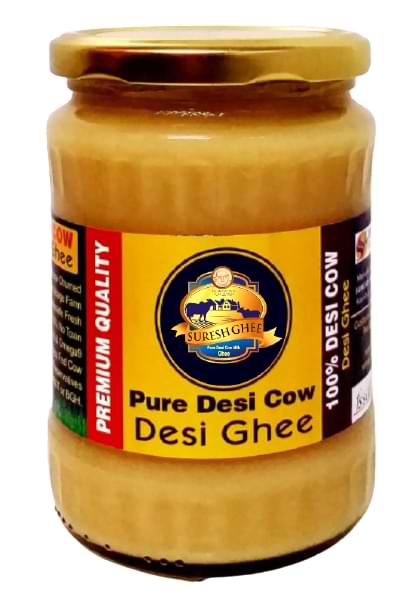
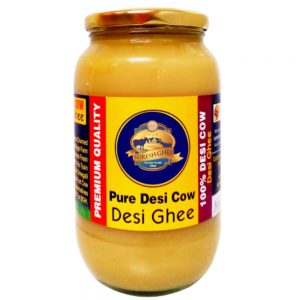
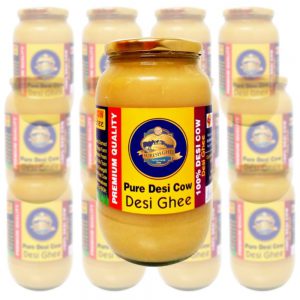
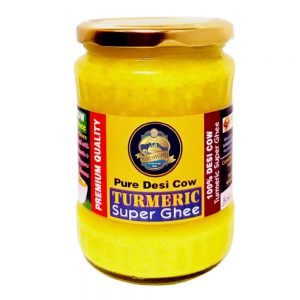
 WhatsApp us
WhatsApp us 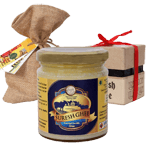
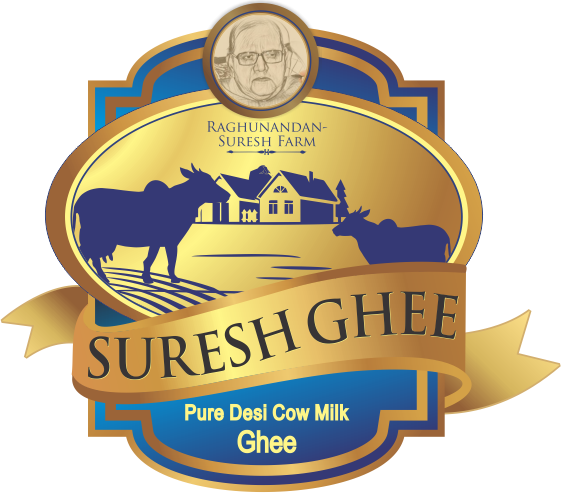
Naveen m...